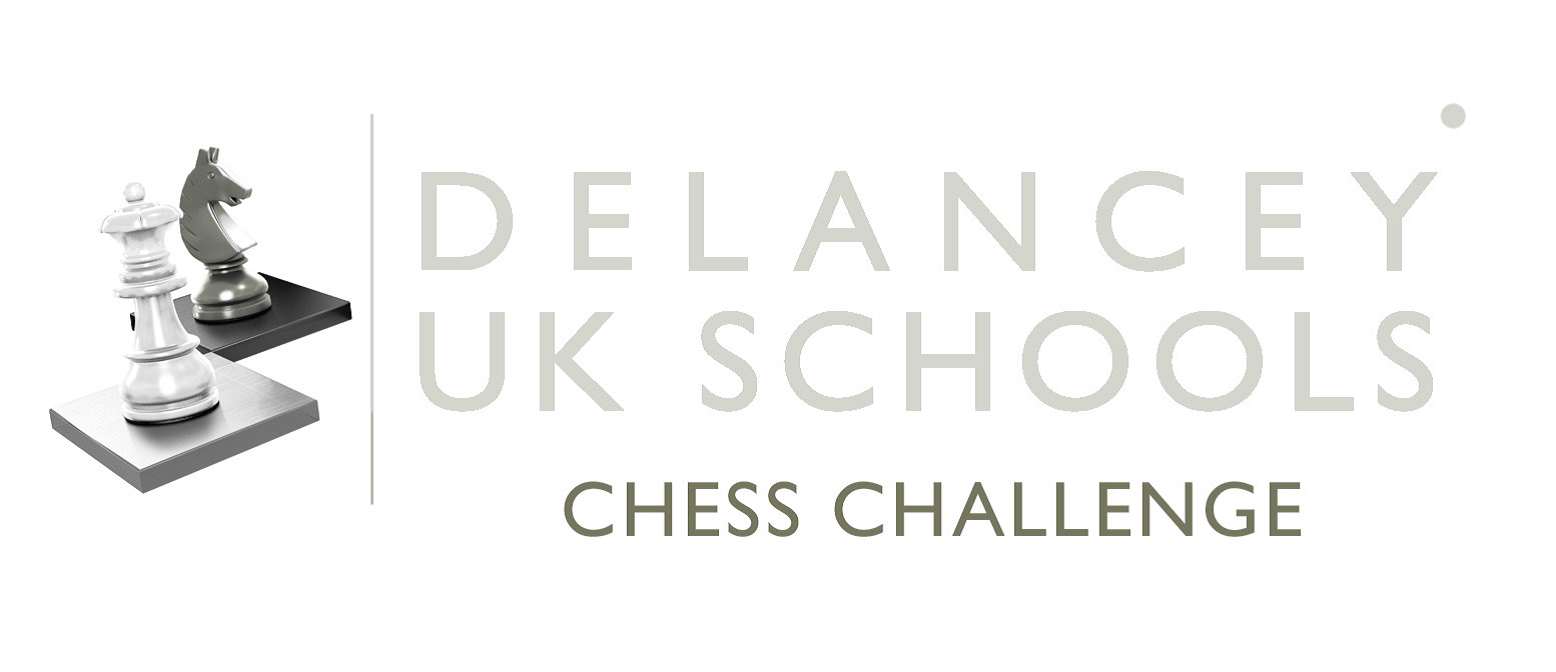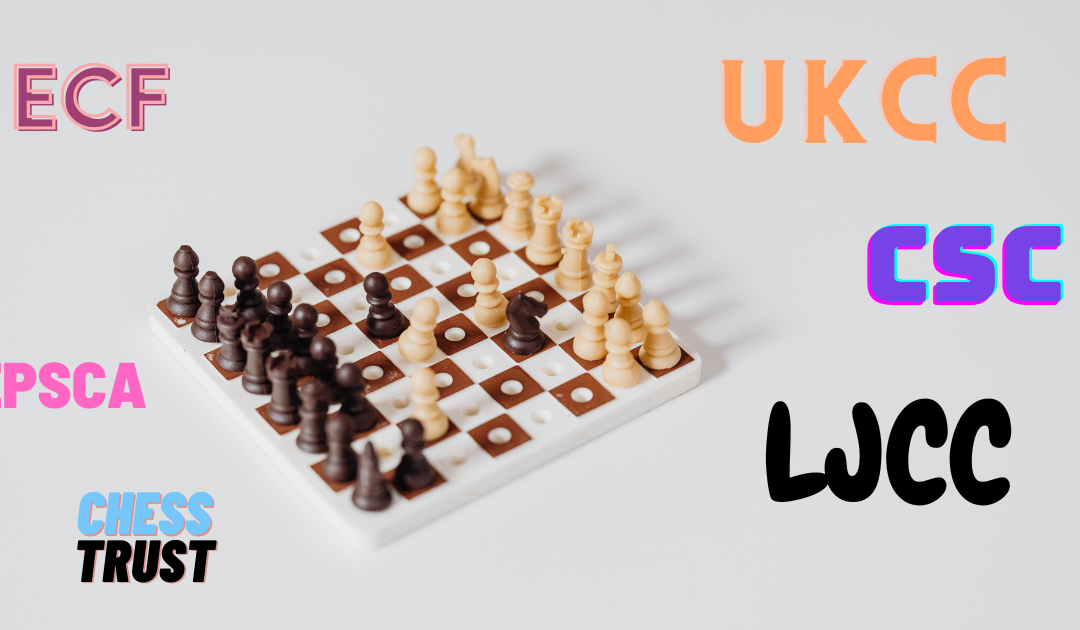Junior chess in England is loosely structured with many competing organisations offering competitions and training. This document aims to make some sense of this and give parents some guidance as to which junior tournaments are worthwhile.
Organisations
English Chess Federation (ECF)
The ECF is England’s governing body for chess and organises the British Championships along with other events. It is responsible for selecting and fielding national teams (juniors, open and seniors) and also operates the ECF Rating system – which is a ranking system which allocates a rating to players based on their results.
UK Chess Challenge (UKCC)
The UKCC run the UK’s largest chess competition (the Delancey UK Schools’ Chess Challenge) and also the UK Junior Chess Academy – a training programme for junior chess players.
The UKCC is a privately owned company, run by Alex & Sarah Longson – both former England international players
Chess in Schools and Communities (CSC)
CSC is a charity whose mission is to introduce chess to schools, inner city communities and to raise the profile of the game. They run school lessons in around 200 schools in England as well as various other community projects. The charity also organise the London Chess Classic and in 2021 and 2022 “Chess Fest”.
English Primary Schools Chess Association (EPSCA)
One of the longest running junior chess organisations – EPSCA have been running junior chess events since the 1960s. The website unfortunately is rather outdated and it can be difficult to understand their activities but their network of ‘EPSCA Associations’ have endured for many years and they continue to run much loved events such as the National Primary Schools Chess Championships and Inter Association Championships (see team events).
EPSCA run an ‘England Under 11 Team’. This unofficial team is somewhat controversial and it can be very confusing as it has nothing to do with the official England Team selected by the ECF, and EPSCA make no attempts to make this clear! However EPSCA have played a tremendous role in English junior chess throughout the years and many junior player has been thrilled to earn a place in their squad (including the Director’s of the UK Chess challenge)!
EPSCA have a somewhat convoluted system of norms and selection criteria to qualify for their squad – again the website isn’t much use so it would be useful if an intrepid parent could collate a list of norm qualifying events and squad events. It should also be noted that EPSCA organise far fewer international trips and events for their squad than used to be the case – partly due to changes in safeguarding expectations.
Chess Trust
The Chess Trust manage a number of funds which have been setup to benefit English chess in general and some of the larger funds specifically to promote junior chess. The Chess Trust current operate the ‘Accelerator Programme’ which is the top rung of the ECF’s Junior Development Pathway. Only a small number of ‘elite’ junior players are selected to receive support from the Accelerator Programme and candidates must apply via the website. Successful applicants receive coaching support as well as financial support to play in competitions and invites to attend special trainings.
4NCL (4 Nations Chess League)
The 4NCL run a number of team and individual competitions as well as the Junior 4NCL – a very well organised junior team league. Their flagship event is the 4NCL which is an Open League which convenes for 5 weekends a year and features several divisions including a very strong first division. They also organise individual FIDE rated tournaments.
Rough Overview of the Structure
The ECF as governing body is the focal point of English chess organisation as they
- Run the English rating scheme
- Organise the official British championships
- Select the international team
However to date they have either failed to create a cohesive regional structure or decided not to. Other organisations have arguably attempted to fill this gap and so what we have in English chess is a lot of organisers and tournaments but a fairly loose overall structure. This has pros and cons. One of the main disadvantages of the current situation is the innate difficulties a newcomer to the English chess scene typically has trying to make heads or tails of it all. Hopefully this document will assist in understanding the junior scene a little.
Up until now perhaps the best way to learn more about the junior chess scene is to talk to other parents or organisers although even here knowledge will likely be patchy.
The ECF have recently launched the Junior Development Pathway which is an attempt to formalise to some extent the provision of coaching and training to junior players. It remains to be seen how many clubs and organisations decide to register for this scheme and whether it will therefore be adopted by the wider junior chess community.
Competitions
Please note this only covers junior tournaments. Please see our Adult Tournament page for information about adult (or ‘open’) tournaments.
Individual Events
UK Chess Challenge (UKCC)
The UKCC run the is the largest competition in the UK and the latter stages are arguably the strongest. It is a ‘multi-stage hybrid’ competition with players having to qualify to each stage and events taking place across the UK as well as online.
Stage 1 Megafinals: March – July. 20 x over-the-board events and 2 online events
Stage 2 Gigafinals: July – August. 2 x over-the-board events and 1 online event
Stage 3 Challengers: September, Mercure Daventry Court Hotel
Stage 4 Terafinal: October, Blenheim Palace
We may be biased but we believe this is the best run and most prestigious junior competition in the UK – with the Challengers and Terafinal in particular being extremely strong.
British Championships
Organised by the ECF, The British Championships are held every August and are a collection of junior and ‘open’ events for different levels. In 2022 there were separate junior championships for U8/U10/U12/U14 and U16. The U18s champion was determined in the ‘Major Open’ event and the U21 champion in the main British Championships.
These are highly prestigious championships played using classical time controls. There are no qualification criteria so any junior chess player can enter – though they tend to be strong events.
London Junior Chess Championships (LJCC)
The LJCC is an annual competition (run by the LJCC Charitable Trust) runs qualifying events from August with a finals in December. Some of the older stages do not require qualification.
Players do not need to be based in London to take part but there are special prizes for London based players. The qualifier events tend to be rapidplay whereas the finals are a mix of rapidplay and classical depending on age group.
This is a popular and well established competition (apparently the first event was the 1924 London Boys Championship). The organisation of the event and the website are a little dated with some complicated rules and apparently no means of registering online. Perhaps the best approach is to email the organisers directly.
Other individual competitions
Many other local level junior tournaments are run and details of these can often be found on the ECF calendar. Some organisers run ‘Grand Prix’ series or qualifying competitions for their local teams (often County level teams or EPSCA Associations).
Team Events
Junior 4NCL (J4NCL)
This is a professionally organised junior team league (18 years old and below) which meets three times a year at selected hotels for a weekend. This is a good opportunity to play several games of classical chess in a team environment. Currently there are two different divisions. Full rules for 22/23 here.
4NCL Website (includes all 4NCL related competitions)
National Primary Schools Chess Championship (NPSCC)
As the name suggests this is a chess competition for primary school teams – so no clubs or other organisations allowed. This competition has a lot of history having first run in 1969. If your primary school has a chess club they will be eligible to register for the competition.
Traditionally the event was held over three phases with a local zonal, a national semi-final and a final. Following covid the 2022 event was shortened by removing the semi-final stage.
To enquire about the event please contact the organiser Angela Eyton npscc@aol.com. Unfortunately the EPSCA website isn’t much help at the moment but hopefully they will start to improve this aspect under new management. Participation will rely on the school entering a team – as a parent wanting to encourage the school to do so it is likely you will need to volunteer to manage the administration and travel arrangements to the nearest zonal event, or possibly even run the zonal event!
Inter Association Championships
Another popular team event run by EPSCA, the Inter-Association championships are team events held at County level (counties registered with EPSCA). There are separate championships for U11s, U9s and U9 girls.
This is a two-stage event with regional heats (zones) typically held in March with the finals in April or May. In 2022 there were two zonals: North (7 teams) and South (9 teams).
To find out which EPSCA association you are eligible for you could try contacting the EPSCA secretary Nigel Dennis secretary@epsca.org.uk. Even if you don’t intend to play in these events it may be worth finding out who your local organiser is and whether they are running other events.
It must be said that the activity and quality of junior associations varies massively across the country and therefore it is a bit of postcode lottery as to whether your association is currently active or running teams in this event.
Recommendations
- Join a chess club – this could be a specialist junior club or a standard club (ie without a specialist junior training section)
- Register for the UK Chess Challenge – Megafinals begin in March/April, you can find out more online or register for updates here
- Find out more about your local junior organisers and events near you. The ECF Calendar is useful for finding tournaments whilst a google search or chatting to local contacts should help identify your local organiser/s
- Players with some reasonable experience should seriously consider playing the British Championships
- Check out the team and individual options offered by the 4NCL (both adult and junior)
If you have any questions please contact us at admin@ukchess.co.uk

